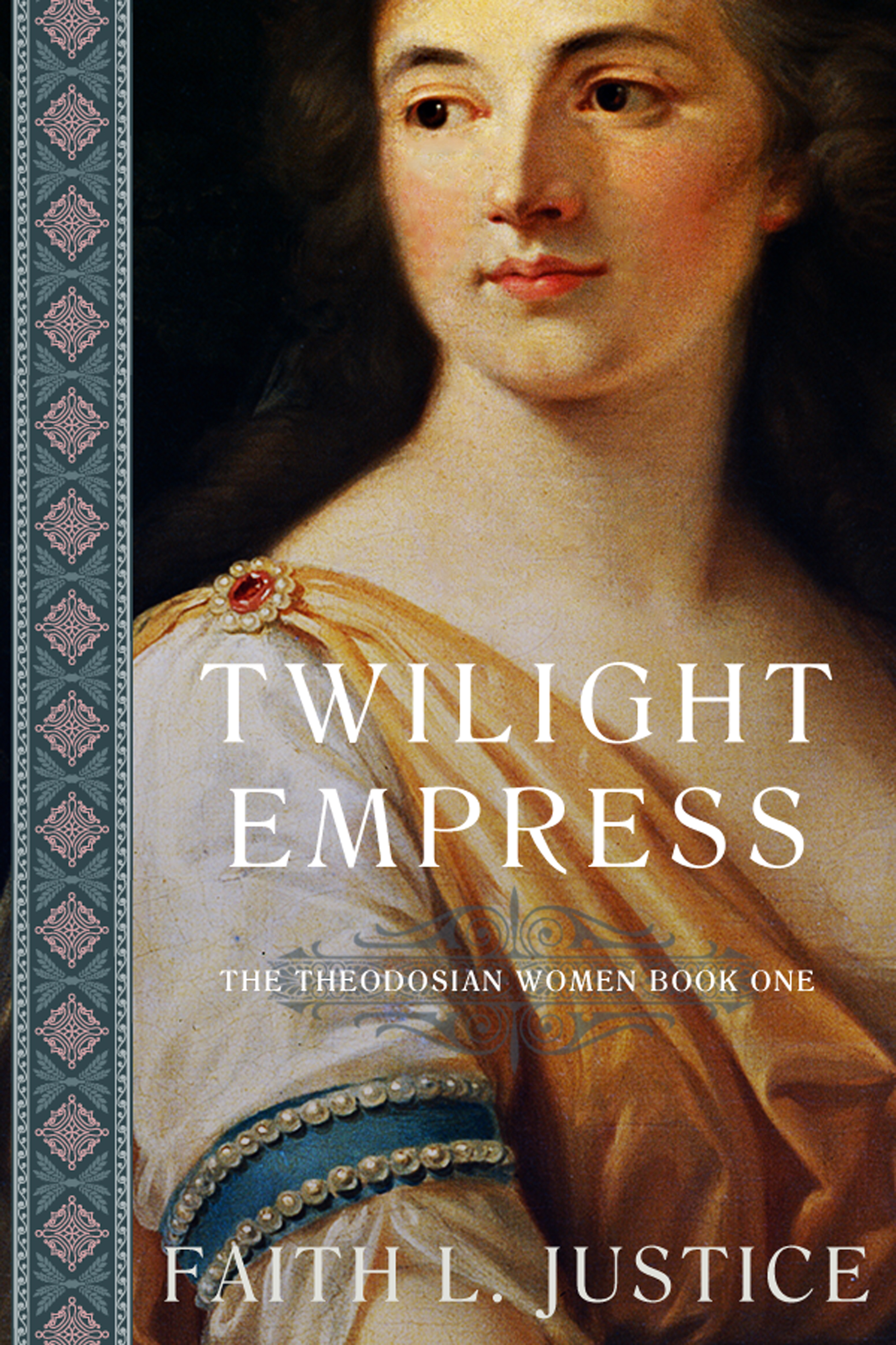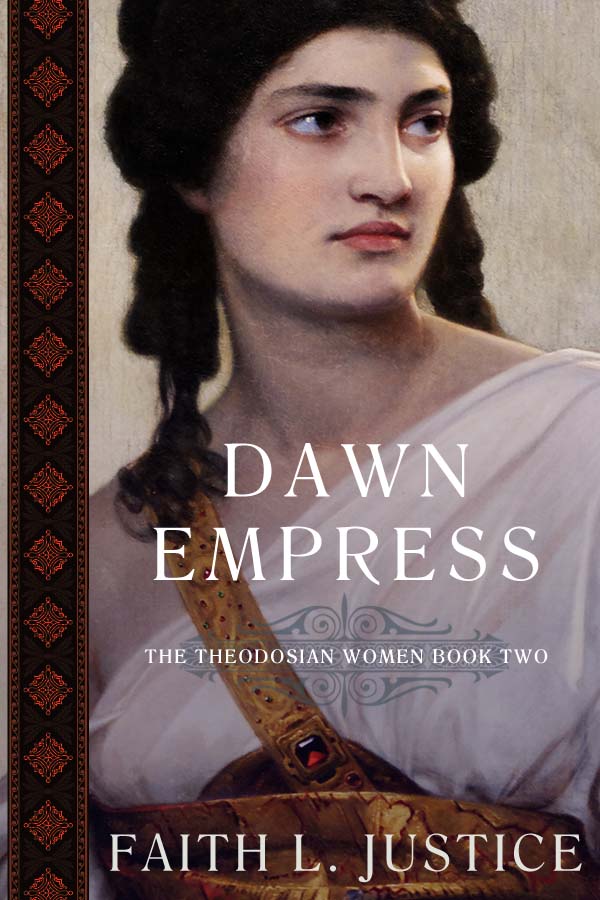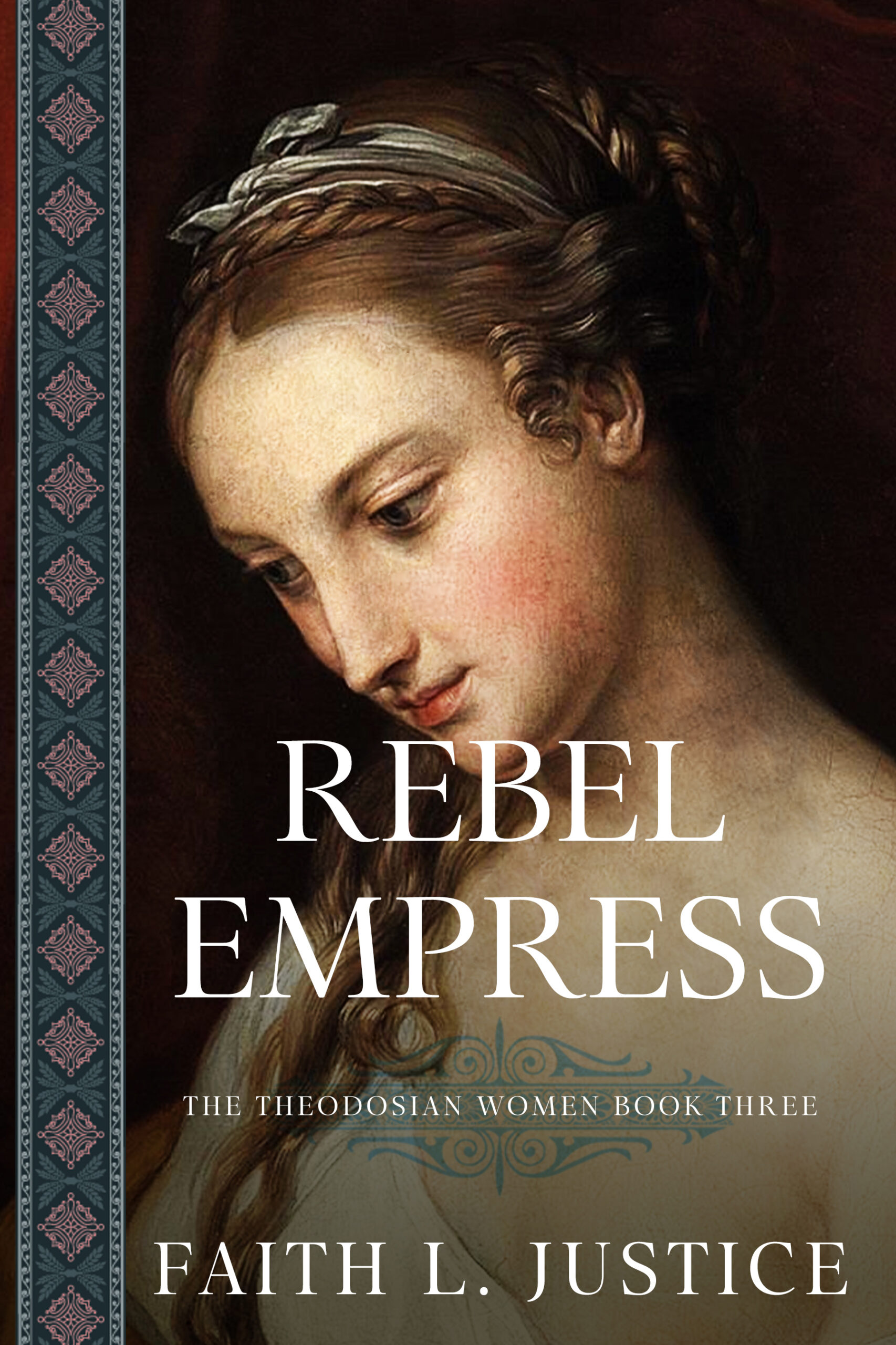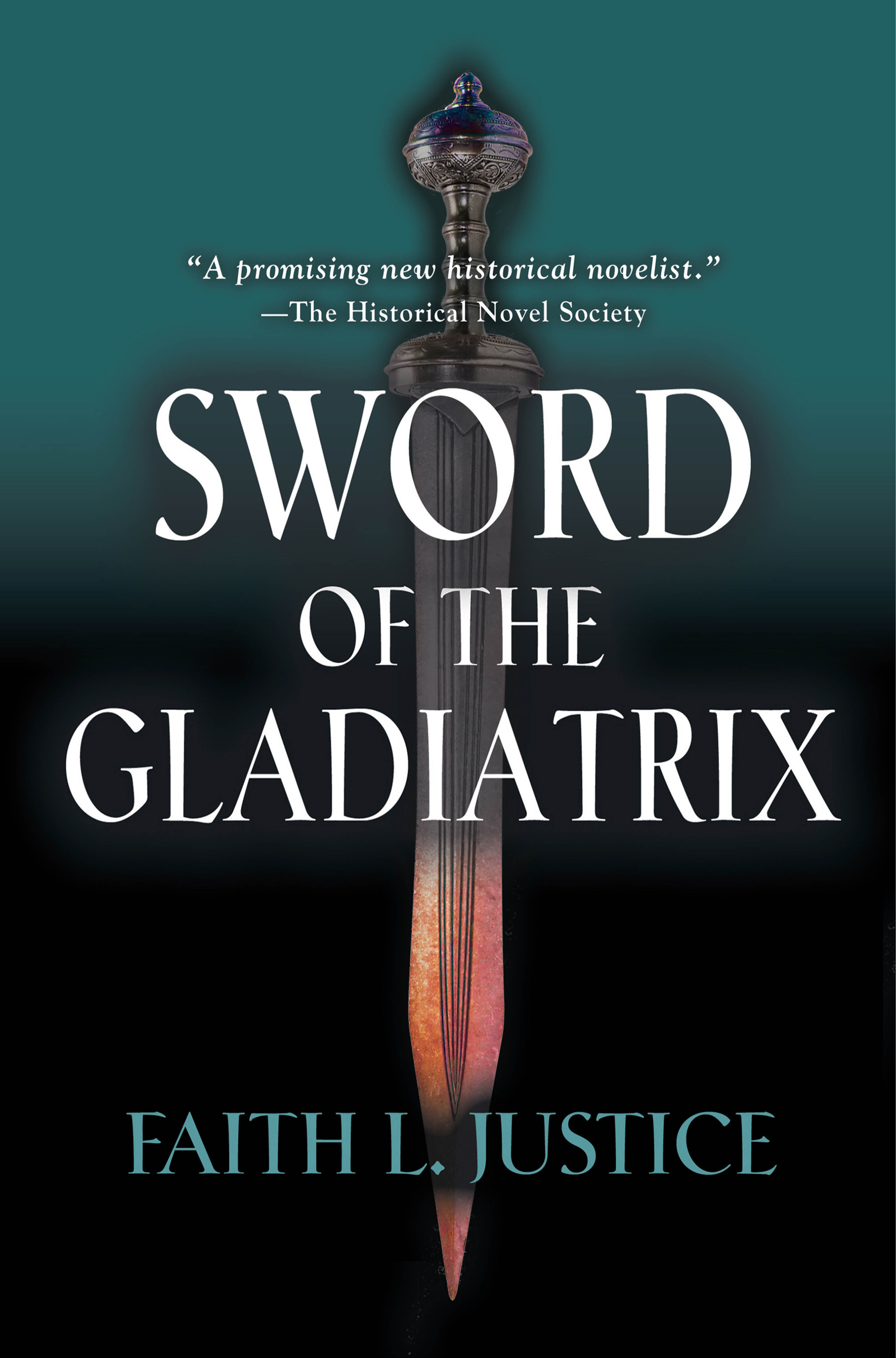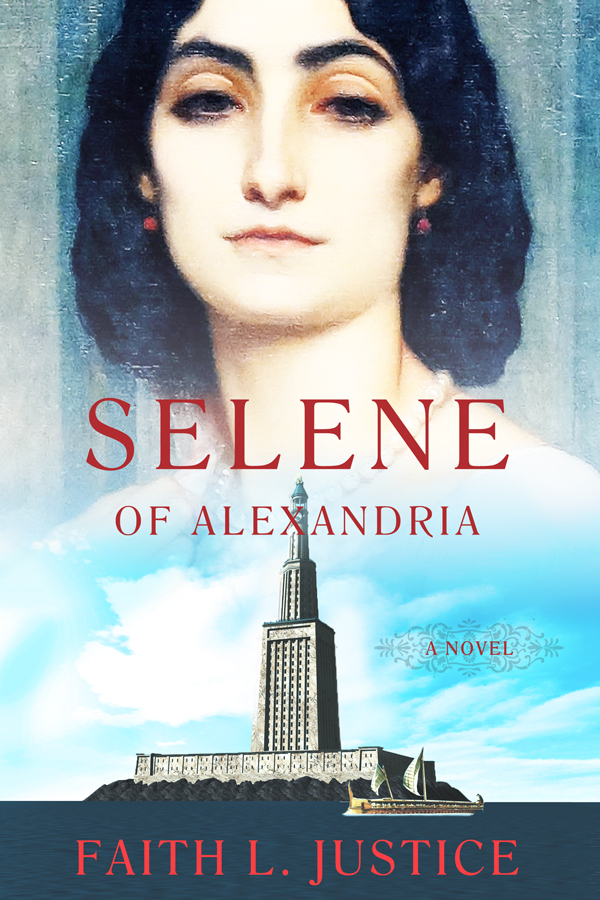Author Interview: Karen Armstrong
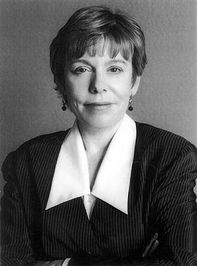 Ms. Armstrong, who calls herself a “freelance monotheist,” is among the foremost religious writers and thinkers in the world. A former Catholic nun, she’s written biographies of Buddha, the Prophet Mohammed, and St. Peter as well as the best-selling books The Battle for God (2000); A History of God: The 4000 Year Quest of Judaism, Christianity, and Islam (1993), and Jerusalem: One City, Three Faiths (1996). Ms. Armstrong talked to me about her writing and research process, her struggles with life after leaving the convent, religious fundamentalism in all its many forms, and Islam in the modern world.
Ms. Armstrong, who calls herself a “freelance monotheist,” is among the foremost religious writers and thinkers in the world. A former Catholic nun, she’s written biographies of Buddha, the Prophet Mohammed, and St. Peter as well as the best-selling books The Battle for God (2000); A History of God: The 4000 Year Quest of Judaism, Christianity, and Islam (1993), and Jerusalem: One City, Three Faiths (1996). Ms. Armstrong talked to me about her writing and research process, her struggles with life after leaving the convent, religious fundamentalism in all its many forms, and Islam in the modern world.
Faith L. Justice: When did you start to write?
Karen Armstrong: My first book, about my life in the convent, was published in 1981—it was a long time after leaving. I found people tended to introduce me at parties and suppers as, “Here’s Karen. She used to be a nun.” I would spend the entire meal being questioned about it and I didn’t have time to explain why—the interior stuff and the rationale that made sense of all these things. So I told funny stories and trivialized the experience. After a while, I wanted to remember it as it was and try to deal with it in some way. The first drafts were very angry. My agent at the time asked, “If it was that bad, why did you stay so long?” The book was a way of coming to terms with the experience and seeing the positive side as well as the negative. Now writing is my living. It’s what I do.
FLJ: Why did you take up the religious life?
KA: For a number of reasons, because motivation is never simple. There was a religious aspect to it—I wanted to find God, or what I thought might be God. I had a teenage oversimplified view: I would find the divine, be filled with peace and serenity, lose all that adolescent anguish and misery, and overnight become a wise saint. I was also very shy and very uncomfortable socially. I was okay at lessons and exams, but socially and emotionally? In the early 60’s, before things loosened up, it was a bad time to be a woman, if you weren’t pretty. Now you can find your own style.
FLJ: And why did you leave?
KA: Nobody stays in a convent very long if they’re looking to escape, because what you find in there is yourself. I was no good at praying, because the kind of meditation we were taught really wasn’t my bag. Not every kind of prayer is right for every person. You have to find your own path, like you do in exercising—something that works for you. It was the wrong kind of prayer for me. I was hopeless at it. I couldn’t keep my mind on God for two minutes, where I could study for hours at a time without even noticing. I seemed to open myself to God and nothing happened.
I began to think there was nothing out there. Gradually I felt God slip away because I tried—rather arrogantly—to give Him the opportunity to take me on board and He declined the option. God had never been much of a reality for me. I had the wrong idea about God. So I left the convent and had a very difficult time for many years adjusting to the world again. But you might say I never left the religious life: I never married, I live alone, and I write, think and talk all the time about God and spirituality. It’s almost as if the convent was a first shot and by trial and error I stumbled into what I do now.
FLJ: What did you do after leaving the convent?
KA: The convent sent me to Oxford University to take a degree in English Literature so I could teach at a Catholic school. I left the convent half way through the undergraduate course, but continued and did post graduate work. In 1973 I worked in the junior division of London University teaching 19th and 20th Century literature. That appointment lasted three years. I didn’t get another job until I became a school teacher. But I lost that job because of ill health—I’m epileptic. The school was very good about it, but it was difficult work and the drugs I take are debilitating.
Someone at an Israeli production company saw me promoting my first book on Channel 4 and rang me up. They wanted me to do a six-part documentary series on St. Paul. I said yes. The budget was absolutely laughable—$100,000 to do the entire thing. They had no teleprompter and hardly any footage. I was parked in front of a ruin and talked into the camera for as long as possible to fill in time. The Israeli producer said it was a religious film in only one respect—it was a miracle it was finished. There was something rough about the film, but it worked.
FLJ: Is that when you become interested in religious history?
KA: Yes. While I worked and lived in Jerusalem, I became interested in Judaism. I had to learn a lot about 2nd Century Judaism to understand St. Paul. At the same time, I became acquainted with Islam and aware of how profoundly interconnected the two religious are and how little—in spite of my intensely religious past—I knew about either Judaism or Islam. Channel 4 gave me a couple of smaller shows which involved more research and I started researching and writing.
For television you need a certain superficial knowledge—you’re one step ahead of your audience. The film company I worked with got another commission from Channel 4 to do a film about the Crusades and they embezzled all the money. Three years work down the drain! They had made another film for South African TV and used the footage for my film, but they didn’t have the copyright. It was awful and caused extreme consternation at Channel 4. They were a young idealistic company and always said filmmakers should be free. But I was left high and dry and that was the end of my TV career.
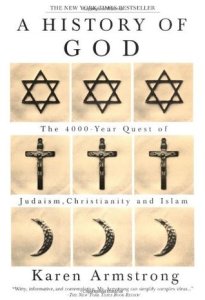 I didn’t have many choices. With a bad health record, I wasn’t going to get another teacher’s job. I thought I was too old to start anything else, but it turned out great. I went off to the library, lived on beans for three years and started to research The History of God. I got to delve into stuff instead of looking for something clever and polemical. I had three years of just thinking, but it looked like a hopeless project. I couldn’t find a publisher for it. People said, “You can’t write about God and the three religions in one volume! The religious people won’t want to read it and the secularists and atheists won’t want to read it either. It’s pointless.” Nevertheless, I went on. After a year, a British publisher bought it for very little money. The first publisher who had the option in San Francisco declined so it went to auction in the U.S. It was a best seller here for over a year.
I didn’t have many choices. With a bad health record, I wasn’t going to get another teacher’s job. I thought I was too old to start anything else, but it turned out great. I went off to the library, lived on beans for three years and started to research The History of God. I got to delve into stuff instead of looking for something clever and polemical. I had three years of just thinking, but it looked like a hopeless project. I couldn’t find a publisher for it. People said, “You can’t write about God and the three religions in one volume! The religious people won’t want to read it and the secularists and atheists won’t want to read it either. It’s pointless.” Nevertheless, I went on. After a year, a British publisher bought it for very little money. The first publisher who had the option in San Francisco declined so it went to auction in the U.S. It was a best seller here for over a year.
FLJ: What’s the writing process like for one of your books?
KA: The big books take three years—not the little ones where it’s just a summary of the research like Islam. The Battle for God took two years just for the research—which is the part I love the best—I’m a scholar. There’s nothing better than sitting in libraries, taking notes and underlining things in red. Eventually, I have to call a halt to the research, because I could go on forever.
The first drafts are about three times as long as the final book—turgid, awful. It’s a bit like a horrible building site, you’re mashing all the material, there are clouds of swirling dust, you can’t live in it, and it’s an amalgam of what everyone else thought. In the second draft you start seeing what it’s all about. It can be that you’re reading a book and you suddenly think “Oh, that’s what it is!” That’s what happened to Jerusalem. I was racing for a taxi, picked a book off the shelf and it showed me what it was all about. With the last book, my Danish translator gave me a book—a dry tome—about myth and rational thought. Suddenly everything fell into place. I just love that — the process of something coming together. I read all these tomes by scholars in the process of research and I acknowledge them in the books, but I like to think something of mine—a little different—comes out.
The whole intensity of having to work to a deadline is important. It gears you up, the adrenaline flows; you push yourself very hard, beyond normal. It’s a mysterious process and a long one. In the end you’re depleted. It’s like having a baby, except after you’ve had it, you give it to someone else to look after for a while
FLJ: What’s your creative day like?
KA: It’s a job, just like any other job and you have to go at it the same way. I usually go to the gym in the morning—exercise, shower, have breakfast. At half-past nine, I go to work either at home in my study or at the British Library, which is terrific. The new building of the British Library is about a mile from my home so I walk there and back. It’s not a very scenic walk, but it’s good for me. I have a short lunch—a micro waved meal at home or sandwiches if I’m at the library. At six-o’clock on the dot, I stop, have a glass of wine and watch the news. I’m tired then and it’s no use going on because I won’t do good work.
FLJ: Who’s your audience?
KA: It’s very interesting—in the U.K. there is no interest in religion at all. Over here I’m impressed with how religiously adventurous Americans are. They come to the bookstores —it’s very refreshing. Americans want to learn. The questions they ask show they are really pushing the limits. The last time I spoke in New York, a chap sitting in the front row (a truck driver) said “I’ve heard you speak three times now. Would you mind doing me a favor and moving to New York City so we can hear this kind of talk about religion more often?”
Our image of American religion over in the U.K. is that everyone is born again or rather happy-clappy and it’s just not so. There are very exciting things happening in the religious world in America—young people, old people, middle-aged people are asking good questions. They’re interested in learning about other faiths. They realize their own traditions teach them a great deal and that’s where they want to stay, but they also realize there are things they can learn in our global world. It’s no more realistic to confine yourself to one tradition than it is to confine yourself in any other way—the horizons have broadened so much.
FLJ: How has your work been received by the academic community?
KA: Here, very generously, because I’m a popularizer, but in the UK that’s bad news. I don’t understand why, because these are important issues—too important to keep to academia that actually tends to write for one another. In England, religion is a dead subject at most universities.
In the U.S., I’ve been received with immense generosity. There are a few who turn up their noses at me and sometimes write to that effect. I’ve been invited to give a lecture and tutorials at Harvard, which I’m looking forward to. I’ve been invited as a guest scholar for several weeks at Georgetown University and Notre Dame University. In America, you might not have the right credentials to get a job, but they are quite generous. You have one of the best Islamic scholars in the world and he’s been nothing but supportive. Here I am in my impudence, self-taught and not knowing the languages—but there is a huge sense of openness and generosity.
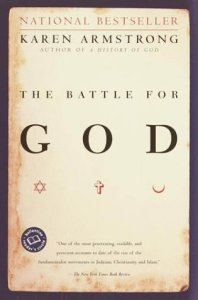 FLJ: In The Battle for God, you discuss how religions have evolved in the past millennia, could you explain the essential differences between pre-modern and modern society/religion what you call “mythos and logos”?
FLJ: In The Battle for God, you discuss how religions have evolved in the past millennia, could you explain the essential differences between pre-modern and modern society/religion what you call “mythos and logos”?
KA: The basic change is economic. During the 16th, 17th, and 18th centuries the West began to develop a kind of civilization that was entirely new and without precedent in the world. Instead of based economically on the surplus of agriculture, as all premodern societies have been, it was based on technology which could be replicated ad infinitum, or so people imagined. During this time science achieved such spectacular results that the old mythical way of looking at religion became entirely discredited.
Today in popular parlance the word “myth” means basically something that’s not true. If a politician is accused of some peccadillo he will often say that this is a myth—it didn’t happen. In the premodern world, myth was a primitive form of psychology, an event that in some sense happened once and which also happened all the time. This is a concept for which we have no word in our language because we’ve lost that sense. We think of history in terms of a succession of unique events. In the premodern world people knew that what they called myth and logos—scientific rationalism—were distinct and entirely separate. You needed both. You needed myth to give yourself the meaning that human beings require from life, because we’re meaning seeking creatures and fall very easily into despair. But you also needed logos—practical, scientific, rational, logical reason to sharpen an arrow correctly or run your societies. But you did not mix the two. Both had complimentary tasks. Each had its own particular area of competence.
Once myth had been discredited, religion had to be rethought. In America, in particular, the fundamentalists became extremely concerned that if the truth of religion were not historically demonstrable and scientifically verifiable facts, then they couldn’t be valid. That’s been a crucial thing in the West. In the Jewish religion people are less concerned with dogma and doctrine than Christians are. This dogmatic concern is a peculiar and unique aspect of Christianity. Judaism and Islam are both religions of practice. People are more concerned to make their religions function effectively in the world and often use the truths of religion as a blueprint for action in a way that usually would not deemed advisable in the premodern world. So religion has changed because our society changed. We rethought the old truths of religion. Fundamentalism is just one of the many attempts to say how we can be religious in the modern world.
FLJ: The essence of your book (The Battle for God) is how fundamentalism evolved in response to modernity. Could you define modern fundamentalism and give us the short course on its roots?
KA: Basically fundamentalism is a reactive and revolutionary movement. It’s a reaction against the rationalistic, secularistic ethos of modern society which developed over a long period of time in the Western world and has since been transplanted in other cultures. As modernity becomes established, a fundamentalist movement usually grows up along side it. There are now fundamentalist movements in every religious tradition—Christianity, Judaism, Islam, Buddhism, Hinduism, Sikhism, and Confucianism. This is not just a peculiar response in a few corners of the world.
The fundamentalist phenomenon represents a profound malaise or disturbance about our new modern society. They feel profoundly threatened by modern society. Every single movement that I’ve studied is convinced that the liberal secular movement wants to wipe them out. As a result they tend to withdraw from society, create a counter culture — a sort of sacred enclave of pure faith where they can gather strength — and eventually they make a counter-offensive — an attack to challenge the hegemony of secular modernity and to resacrilize the world. They fight a battle for God in a monotheistic sense. Not every traditionalist or conservative person is a fundamentalist. What characterizes a fundamentalist is this embattled sense, the determination to campaign on behalf of the divine, and to bring God off the sidelines to which He had been relegated in modern secular society.
The tragic flaw—to borrow a literary term—in some fundamentalists is their use of mythos as a plan of action in the real world. You see this in the Dome of the Rock incident, millennial cults and recent African self-destruction. These people retreated from the world rather than create a counter offensive. It requires actions to bring God back, not just to make a retreat. They got stuck in the retreat phase and made the final retreat.
FLJ: Has the modern secularist movement spawned its own version of fundamentalism?
KA: There are certainly secular fundamentalists—people who feel religion is something barbarous that should be stopped. They feel threatened by religion because of its hold on people. It threatens their beliefs that religion is going to wither away as the clear light of reason dawns. Very often these are people that have as bigoted a view of religion as fundamentalists have of secularism.
FLJ: I was disturbed by your discussion of the “two worlds”; that unlike other situations of prejudice “getting to know one another” does not bring fundamentalists and secularists closer to understanding.
KA: I wrote this book because I think we need to draw attention to this fact. We can’t confine ourselves to our own circles and not realize we’re sharing a culture or a society with people who have diametrically opposed ideas. For example, the Salmon Rushdie crisis was a clash of two competing and irreconcilable ideologies. One side saw the sovereignty of God as the essential thing and could not therefore tolerate blasphemy. The other saw freedom of expression as the sacred value. The two could not find a bridge to speak to one another. All they could do was revile each other.
FLJ: We do seem “trapped in an escalating spiral of hostility and recrimination.” What can individuals and institutions do to better this scenario?
KA: I don’t have a quick fix. I call the book The Battle for God not just because it’s a snappy title, but because I do think secularists and religious people in a country like the U.S. are in an incipient state of war. This occasionally surfaces like at Waco, Texas or the Oklahoma bombing. People don’t understand. The federal troops did not understand the Waco community and behaved ineptly and the Waco community did not know how to communicate with the secular world.
In the Middle East, two wars are being fought. The first is between the Arabs and the Israelis. The other, as the murders of President Sadat of Egypt and President Rabin of Israel by religious fellow countrymen shows, is between the religious and the secularists within the cultures. There is a state of war. We know about peace processes. Look at Northern Ireland which was proceeding smartly and now has hit insuperable difficulties. It’s not something where you can get an arbitrator in and sort things out. Hurt feelings, prejudices and sacred values have been trampled by both sides. There’s a residue of hurt.
In any peace process you have to get the participants to the table. I don’t think we’re nearly ready for dialog. But I wrote this book because someone has to start to listen. I wrote this book in an attempt to decode some of the fundamentalist theologies, imageries, fantasy and scenarios, which look bizarre to an outsider. But any religious practice or belief looks and sounds bizarre to an outsider. Why do Catholics dip their fingers in water and sort of slap it around their bodies? It sounds insane unless you know about the cross and understand the roots of the emotion it addresses. I’m trying to find the fundamentalist movements’ roots; decode what they are trying to say.
Before we can even begin a dialog, we have to listen to the profound fears and terrors that fundamentalists express. They often don’t express it coherently, but we know in our own lives when we’re frightened, we find it difficult to express our fears rationally. When we’re really, really frightened or a child or animal is frightened, it’s no use telling them to pull themselves together, be more rational, get on with life and face facts. It doesn’t work like that. People become paralyzed. Every fundamentalist movement I’ve studied is rooted in profound terror. It’s a matter of extreme urgency. No government or society can safely ignore such anxieties.
FLJ: You leave us with a question “What lessons can we learn from the past that will help us to deal more creatively in the future with the fears that fundamentalism enshrines?” Do you have any thoughts on possible answers?
KA: Only what not to do, because I’m an historian. I know you Americans like an upbeat scenario at the end, but I think things have got out of hand here. What we mustn’t do is ignore the fundamentalists or dismiss them as a bunch of crazies. That simply exacerbates matters. Nor does it help to either suppress or attack. Fundamentalism, as we see historically, develops in a symbiotic way with aggressive modernization and secularization. Each movement I studied began with an assault by the secularist establishment or so called liberal establishment. The worst kind of Sunni fundamentalist developed in the concentration camps into which President Nasser interred members of the Muslim Brotherhood — often for doing nothing more than handing out leaflets or attending a meeting.
The Shah used to have his soldiers go through the streets and take the veils off women with their bayonets and rip them to pieces in front of them. On one occasion in 1935 he had his soldiers kill hundreds of people who were peacefully protesting the secular dress laws. In this kind of atmosphere, it is not surprising that people experienced secularism, not as benign, but as an assault. When fundamentalism is suppressed or reviled, as was done in the Scopes trial in 1925, it simply drives fundamentalists to greater extremity.
FLJ: Why did/do people feel the need for something greater than themselves and how is it different in pre-modern and modern times?
KA: In saying “the need for something greater than themselves” don’t fall into the trap of thinking we have to have a God figure. We don’t need that, but we do need a sense of sacredness.
FLJ: Why?
KA: Because it’s how we are. Human beings are the only animals that have to live with the knowledge of their own mortality. We’ve always found that vision of extinction extremely disturbing. We are creatures that fall very easily into despair. Dogs don’t have a great deal of difficulty living up to their canine nature. They don’t agonize over the dog condition or the plight of dogs in other parts of the world or what the canine life is for. We do! If we can’t make some sense of things or make a pattern, we fall into despair. As soon as we fell out of the trees and became recognizably human we started to create religions. At the same time we started to create works of art. The two are related.
We should see religion as an art form. It helps us find significance, beauty and meaning in a frightening, tragic world. Life is hard. We look at human injustice or natural disasters wiping out the guilty and the innocent and it doesn’t get any easier. We created religion to keep ourselves psychologically whole. Men and women are “homoreligiosis” —we’re religious beings. That doesn’t mean we have to subscribe to particular theologies about God or the divine, but we need to cultivate a sense of sacredness. We’re almost the only animals that kill their own kind. Religion at its best (it’s vital to underline this because there is bad religion, just as there is bad art and bad sex) helps us cultivate a sense of sacredness—the absolute, inviolable value of a human being and other beings.
FLJ: Where does “logos” come in—the God-gene, research into brain chemistry and emotions, mystics vs. schizophrenics?
KA: I’m not particularly interested in the God gene. We can only know our own human condition. We crave ecstasy in our lives. That doesn’t mean we need to talk in tongues or go into an exotic state of consciousness. We seek out experiences that take us beyond ourselves—that transcend our existence. “To go beyond the self” is what ecstasy means. We get it when we’re touched deeply within; lifted momentarily beyond our mundane concerns and feel for a few seconds that everything is absolutely fine. Even though we’d be hard put to justify that conviction in rational terms. This is something we do. It’s something we seek out.
Religions used to provide a way. People are very pragmatic. When they can’t find ecstasy in a synagogue, church or mosque, they’ll look for it elsewhere—in art, music, sex or even drugs. This is what we do. Whether it’s a gene or not, it’s all we know. Religion has to be cultivated. We’ve lost that in the modern world. We think we have to satisfy ourselves of the existence of a God (something which is an absurd concept to me) and then we’ll live the religious life. If we can’t satisfy ourselves about God then we won’t live a religious life—why should we if there’s nothing out there? This puts the cart before the horse. The myths of religion only make sense in a system of prayer, worship and ethical action.
We have to cultivate our sense of the sacred in the same way we cultivate our esthetic senses. It’s not a question of walking into an art gallery, never having set eyes on a piece of western art before and seeing a Matisse and saying, “Wow!” You have to train your eye. It’s very difficult to listen to other culture’s music, because we have different expectations of melody and harmony. You have to train your ear. So you have to train yourself to discern the sacred in others. That’s what religion is supposed to be about, not about imposing dogmas.
FLJ: You express some admiration for disciplined rational approaches to spiritual fulfillment, do you practice any beliefs?
KA: I don’t belong to a religion or a church. I call myself a freelance monotheist. I think one has to cultivate a sense of the divine, but I don’t think determination is going to do it. Some people are very good at religion and some people are not. Not everybody who learns the piano will end up playing like Alfred Brindle. Nevertheless, if you tried the piano at least you’ll appreciate Alfred Brindle a bit more and learn and have a sense of music, if it hasn’t put you off. Some people have had bad piano lessons or bad religious experiences and want nothing more to do with it. A lot of atheism is fueled by that, I think. It’s not just a question of clocking into something and it happening.
I don’t think the British are very good at religion at all. It’s very nice coming over here, because people better understand what I’m talking about. Whereas in England, they’re interested, but it’s as though I became an expert on the manners of some obscure Polynesian tribe. You know, “Fascinating, really!” But they have no idea what it’s for. The Dutch, who are a secularist and liberal people—you know wicked Amsterdam!—understand about religion much better. Religion is very very difficult, like great art. It’s not surprising that we sometimes fall on our faces when we try to be religious. It’s difficult to implement the sacred imperative in the flawed, confused, and tragic circumstances of our daily lives.
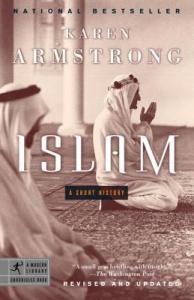 FLJ: How did you get involved in this series (Islam a Short History)?
FLJ: How did you get involved in this series (Islam a Short History)?
KA: One of the editors had worked with me on Jerusalem as a sub-editor before he got into the hierarchy. He knew my work and thought Islam would be good for me. So it was simply knowing the right people. They wanted a short, slim volume to give you somewhere to start, with lists of books for further reading, so you can explore further on. I think it’s a good idea. Forty thousand words is a lovely length, but for Islam it’s hard to compress 1500 years. I had to find the theme and tell the story.
FLJ: Other than get people started, what do you want to accomplish with this book?
KA: To correct some of the imbalance. The long history of Western prejudice ever since the Crusades has troubled me ever since I became interested in Islam, way back in Jerusalem. Islam was like the United States. Europe was an undeveloped country—way behind the big civilizations after the Dark Ages and the collapse of the Roman Empire. Everywhere you looked there was Islam—Turkey, the Middle East, India, Japan, China, Southeast Asia. It was a far-flung empire. In the 16th Century, it was the most advanced civilization in the world. In Europe, we were coming up, but we hated a lot of people, which we often do when we’re in a position of striving. We approached history with a hostility towards Islam.
It comes out in all sorts of ways. In the media they assume that Islam is quite fanatical, intolerant, violent and bad about women, but it’s no better or worse than any other major faith. People think fundamentalism is an Islamic tradition, whereas fundamentalism is in every major faith. And none of the great world religions is good about women! Islam has a much better record of tolerance than Western Christianity. It has a kind spiritual tradition, a philosophy of openness. I wanted to correct that distorted view, because we’ve learned in the 20th Century it’s dangerous to hold any such inaccurate stereotypical view of people and religion. It damages our own integrity to support an intolerant culture. Islam has its flaws, but it also has great strengths.
FLJ: You’ve described Islam as more concerned with how life is lived rather than with religions credo—orthopraxy vs. orthodoxy.
KA: Each religion has ways of apprehending the divine. One of the chief ways that Christians have is formulating doctrine. Doctrinal activity, especially for the Greek Orthodox in the beginning of Christianity, is a bit like the tribal dance in other religions. They loved metaphysics, they loved talking about this stuff—it gave them a buzz. Doctrinal activity is an Achilles heel, because Christians can, and very often have, assumed that their doctrine is the last word about God. But God is infinite and beyond human speech, you can’t make God fit into human boundaries.
In other religions there isn’t that interest in doctrine. For example your theological opinions are a matter of total indifference to the Buddha. He couldn’t care less about what you believe about God. Buddhism is about living in a certain way and in that way you apprehend the divine. So is Judaism. In Judaism, you can within reason believe anything you want about God, but what you must do is observe the Torah—the Law of Moses. There are many arguments about that, just as Christians have doctrinal arguments, but nevertheless, by living a certain way, observing diet restrictions, you develop an attitude that makes you receptive to the divine. That’s the idea.
Islam is in that system. You have five core practices that help you develop that sense of the divine particularly by living together in community. The Koran is highly skeptical about the theological speculation that divided the Jews and the Christians. They think it is self-indulgent and disgraceful that Jews and Christians argue over something like the divinity of Jesus and how bad it is to split the religion of the One God into warring sects. So the Koran doesn’t give doctrine, but the message that it is good to share your wealth equally and bad to build up a private fortune. Your first duty is to build a just world where the poor and vulnerable are treated with respect. Your effort or struggle—jihad—is to achieve this world where you learn to lay aside your own selfishness and recognize the needs of the poor, elderly, sick and give them a priority over your own needs and selfish wants.
Jihad doesn’t mean holy war, but struggle or effort. Sometimes you might have to fight, but the Koran is against any kind of aggressiveness. It says that aggression is evil. A nation might engage in a just war to preserve these values, just as it was necessary to fight Hitler in WWII. But it’s very carefully hedged around that you must make peace as soon as the enemy offers and withdraw troops as soon as possible to bring peace back. Jihad is effort. The prophet Mohammed, in a very important teaching, said, “I am going home from the battle with my brothers. We are leaving the lesser jihad—warfare—to return to the greater Jihad—the struggle to implement the ideas of the Koran in our own society and our own hearts.” That is the greater jihad. Warfare is the lesser jihad that you might have to engage in in this flawed tragic world.
FLJ: No society lives up to its ideals. Mohammed and his successors were warriors.
KA: They had nothing. They lived in the desert on the verge of malnutrition and when there are few resources, the tribes fought one another. The Prophet was able to stop this and give them a religion that united and gave them hope. It took a long time for them to come up with what they meant by Islam. At first it may just have been experience of having been united by the Prophet — it was so extraordinary, it happened so quickly — ten years. But gradually people began to deepen the experience and what was meant by the Koran. They applied it to conditions the Prophet couldn’t imagine.
It’s a struggle to implement any religions ideal. Christians are told to love one another and turn the other cheek, but nevertheless they argue with each other about that in the same way Christians argue about the divinity of Christ—the doctrinal arguments about whether Jesus was a God or man. The community is important in Islam. If the community is humiliated, corrupted or ruled by unworthy or unpleasant politicians such as Sadam Hussein; it’s the same as if the Bible were spattered or the Eucharistic host torn apart. In Islam, you have the concept of ummah—a sacrament—a sacred activity where you encounter the divine and make the divine function effectively in the world.
FLJ: How does ummah work in the modern world with a division of church and state?
KA: We’ve divided church and state for very good reasons. Whenever, in Europe, we’ve mixed religion and politics the results were catastrophic: persecutions, inquisitions, reigns of terror, horrible impositions of religion and the crusades. The 18th Century enlightenment produced the secular state which worked out well for religion. Religion flourishes in the U.S. much more than England where we have an established church. But there are also dangers to that approach. There’s that hymn “All Things Bright and Beautiful” and the line about the Rich Man in his palace and the Poor Man at the gate as if this were part of God’s bright and beautiful plan for the world. Politics is a dirty business. That’s why most states have in fact—not in theory—separated religion and politics.
The ummah is an entirely different ethos and the sharia—the law of Islam—developed as a protest culture against the privilege, sophistication and inegalitarianism of the court. Rich caliphs lived in luxury and poor people struggled. Islamic theology moved forward by contemplating current affairs and politics. The scandal of the caliphs made Islam think about their religion and bring forward new Muslim philosophies, practices and literature. Those debates over who should be the caliph, who should be the man to lead the Islamic ummah were as formative in the early years as the ancient Christian debates about the divinity of Jesus in the early 3rd and 4th Centuries. Politics is something Muslims contemplate and agonize about but effectively have separated it from religion.
FLJ: Where are they at with that now?
KA: They’re still debating it just as Christians are still debating about who Jesus was and can’t agree. It’s difficult. No group has created an ideal faith where the poor and downtrodden are treated with respect, so the struggle goes on. People are trying it different ways. Pakistan is a Muslim state, but it is spends far too much money on arms and corruption. The Ayatollah has a state living by Islamic law and that has its problems. The Saudis are not religious at all. They are rolling in wealth and go off to drink alcohol in casinos in foreign countries while there’s huge poverty in an oil rich country. What does it mean?
The debate continues because people who go into politics are not usually the most self-effacing, generous of human beings. So the debate goes on about what it means to be a Muslim and how to be a Muslim in a predominately non-Muslim world. I’ll be speaking to a group in Los Angeles of young people that are determined to take part in American society and democracy and be Islamic. I tell them they can be a bridge between East and West and challenge Americans with their ideas and actions.
FLJ: What about democracy and Islam?
KA: Nobody can make legislation without consulting the community. Muslims have a problem with the slogan government of, by and for the people—but you don’t have to have that to be a democracy. Unfortunately, democracy has been espoused by the left, while the right has been promoting horrible atrocities like supporting the Shah—there was nothing democratic about his regime. The message is, “We believe in democracy but you have to have a tyrant.” That gives democracy a bad name. They are coming to it on their own because the pressure of the modern state demands that they become democratic, but they want to do it in an Islamic way not as bad copies of us.
FLJ: What’s Islam’s view on protecting minorities?
KA: Islam has always treated its minorities very well since its earliest conception—much better than the way Western Europe treated its Jews. It’s got a good tradition. They can do it. There is nothing incompatible about that and Islam.
FLJ: What effect did the Christian Crusades have on Islam then and now?
KA: Very little, except for those who died. We read about the Crusades and Richard the Lion Heart going off to battle in the Holy Land, but when they reached Jerusalem they massacred 40,000 Muslims and Jews, which even by the standards of the time was an atrocity. They said the blood came up to the knees of the horses. But with the communications at the time the only people who were really affected were in Egypt, Palestine and Syria. Not Iran, or India or Central Asia because these were remote areas.
The new crusaders—the colonialists in the 18th and 19th Centuries with their missionaries trotting behind—brought modernization but only so far as it would advance their own mercantile interests. The majority of the Muslim world was not affected by early crusades because they were not there. They came back after the crusades and created something good and viable and creative.
FLJ: What’s their future?
KA: I was trying to show that the Islamic response to the West was not that peculiar to this century, but paradigmatic. The first people to experience the westernization of the world were Muslims, whether you are talking about Africa, the Middle East, India, Japan or China. They were the first people to bear the brunt of westernization and the dominance of Western capitalism. In the West, we had three centuries of revolution, ethnic cleansing, exploitation of poor and women and children in factories, despoiling the countryside and urban slums. Now we’re watching the same process in the Middle East, but worse, because they have to do it much quicker than we did.
Modern ideas of democracy remain among a small cadre of educated elite, but they haven’t had time to trickle down and they can’t do it according to their own agenda. What was difficult for us is difficult for them as well. The 20th Century is called the American Century and the 19th Century was the British Century. Maybe the 21st will be the Chinese Century where we have to learn the Chinese language and wear Chinese clothes.
FLJ: You’ve said “Religion is highly pragmatic. It’s far more important for a particular idea of God to work than to logically or scientifically sell it.” How does that fit in with Islam?
KA: Islam would have failed, people would not have followed the Prophet, the religion would not have taken off, if people had not found that by living according to the five core practices of Islam worked for them. Islam responded to various challenges — expulsion from Spain, corruption in its midst, Mongol invaders. In spite of these tragedies, people found that living this way brought hope to the community. Once a religion stops giving hope, it’s not fulfilling its mission. Churches are empty because people who go to church don’t find the sublime. That’s what happened to the old pagan religions. They stopped being able to respond to the new type of society that was developing and became obsolete. New religions with new symbolism took over. Islam is one of those.
FLJ: What’s your opinion of the current Mid-east peace talks?
KA: If there is not a settlement or solution to Jerusalem tensions will go on. It seemed possible in the past for the tree religions to coexist. Under Islam they did pretty well. It wasn’t Shangri La, but the three communities were able to live together in relative peace and harmony. Since 1966 a religious element entered the Middle-East conflict. Zionism began as an entirely secular movement. It was a rebellion against religion. The Zionists were absolute pragmatists. They were perfectly prepared to trade parts of the Jewish state and allow the Arabs to take East Jerusalem. There were pragmatists on both sides. But both sides experienced an upsurge of religious belief in 1965 or 1966. Every major proposition since has made religion a form of government. Jerusalem has become a fateful symbol bound up in absolute religious beliefs. In this mix no one can back down and that’s a tragedy because here are two peoples who need one another.
There are people on both sides who are willing to compromise but you can have war in five minutes. To bring peace closer takes a long time. Look at what happened in Northern Ireland. First you take three steps closer and think “Great” then someone knocks your hat off. You have to keep going and keep going and keep going until people decide that the war, the hatred, young people being killed are not worth it. I think it is that, rather than any nobility of the soul, that pushes people to the table. We’ve got a long way to go and its not just a question of time—these people have made war now for sixty years and it might take another sixty before they can settle.
FLJ: What advice would you give to the President to help make peace?
KA: I think he should first acknowledge that this is really hard and not just a question of bringing these people together. Any solution has to be from the people themselves. When people have been feuding for centuries, they are hurt and upset. High-handed tactics won’t work.
FLJ: You seem to have a great affection for Islam—where did that come from?
KA: My driver in Jerusalem was Palestinian. He would pick up some of his friends to give them a lift. These young men never went near the mosque. One night we were driving around drinking beer and the Koran came on over the radio. In the U.K., if I was driving around London with a bunch of beer drinking young men and the Bible came on, they would all be vying for the off button. But these young men were transfixed by the absolute beauty of the language. They tried to translate it for me—it’s very difficult to translate. I was impressed by the way they talked about Mohammed with real affection and love—not anything like what a Christian youth in Europe would talk about Jesus. They talked about him like he was a member of the family, somebody you really know and are fond of. This was impressive to me and I thought there must be something in this and I started looking.
When I left the convent and struggled all those years, I was becoming atheist. What brought me back was the study of other faiths. Judaism was just as crucial to me in the rediscovery of myself as Islam. From both of these traditions, I got an inkling of what my own tradition tried to do. Muslims were the first people to treat me as more than a runaway nun. With Islam a Short History, people said, “You’ll end up like Salmon Rushdie. They won’t like that a western woman wrote it.” But I’ve found a huge generosity, appreciation and warmth of response. Yes I do have affection for Islam. They’ve been very kind to me. I teach at a Jewish rabbinical college in London and they’ve provided me with a whole community that is very warming. I owe a great deal to these faiths for giving me back my own.
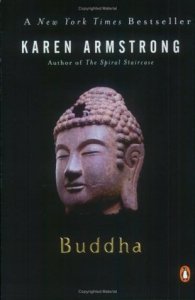 FLJ: You told me about your new book on Buddha coming out, any other projects?
FLJ: You told me about your new book on Buddha coming out, any other projects?
KA: I’m going to write a history of the Axial Age, that brief and extraordinary period when all the great major world religions came into being—monotheism, Buddhism, Confucianism, Greek Rationalism. The similarities between Buddha and Socrates are quite fascinating and show us important things about our humanity and what we are capable of. What those actual people were doing would be considered absolutely horrifying by some of our religious leaders today. They suggested no one can take anything on faith; that you find out things for yourself. Compassion was the main virtue, not keeping in line theologically. It’s a challenge to say how religion grows. It can’t be foisted onto people by human beings. It’s something that human beings find warm and pragmatic. People have found the best way to live is in love. Love in a disciplined way, not handing out a few flowers and saying, “We love you.”
FLJ: How far are you?
KA: Just posted off the proposal to the publisher. It’ll be a couple of years before the manuscript is finished.
FLJ: Thanks so much for your time.
KA: You’re welcome.
© 2008 by Faith L. Justice
Author’s Note: I had the distinct pleasure of interviewing Ms. Armstrong twice in 2000: once on the phone when she was touring for Battle for God and later in person when she was back in the U.S. for Islam: A Short History. Since then, she has published several more books. A select bibliography is listed below. Portions of these interviews appeared in:
- “The Fundamentalist Battle for God” in Catholic Digest, 2002
- “The Roots of Islamic Fundamentalism: An Interview with Karen Armstrong” in In These Times, 2001
- “Fundamentalism and the Freelance Monotheist: An Interview with Karen Armstrong the Author of The Battle for God” in com, 2000
A select bibliography:
- The Bible: A Biography, Atlantic Monthly Press (November 10, 2007)
- Muhammad: A prophet for Our Time, HarperOne; Reprint edition (August 28, 2007)
- The Great Transformation: The Beginning of our Religious Traditions, Knopf (2006)
- Through the Narrow Gate, St. Martin’s Griffin (2005, original publication 1981)
- A Short History of Myth, Canongate U.S. (2005)
- Buddha, Penguin Books (2004) (original publication 2000)
- The Spiral Staircase: My Climb Out of Darkness, Knopf (2004)
- Islam, a Short History, Modern Library (2002, original publication 2000)
- Holy War: the Crusades and Their Impact on Today’s World, Anchor (2001, original publication 1988)
- The Battle for God, Knopf (2000)
- In the Beginning: A New Interpretation of Genesis, Knopf (1996)
- Jerusalem: One City, Three Faiths, A. A. Knopf (1996)
- Visions of God: Four Medieval Mystics and Their Writings, Bantam (1994)
- A History of God: The 4000-Year Quest of Judaism, Christianity and Islam, Ballantine Books (1994, original publication 1993)
- Muhammad: a Biography of the Prophet, HarperSanFrancisco (1993, original publication 1992)
- The Gospel According to Woman, Anchor (1991, original publication 1986
- The First Christian: Saint Paul’s Impact on Christianity, Pan Macmillan (1983)
- Beginning the World, St. Martin’s Press (1983)
